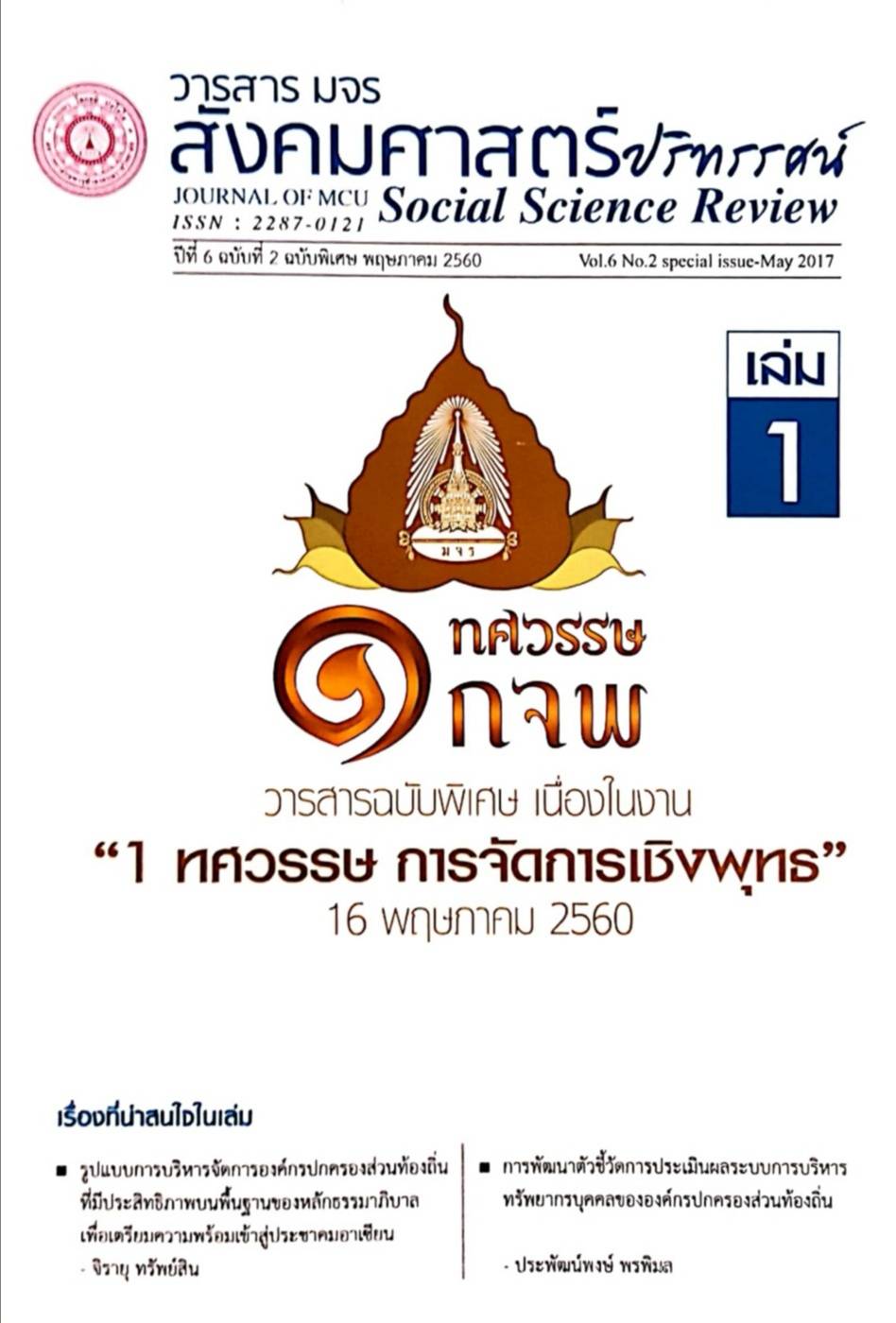กลยุทธ์การจัดการโรงเรียนการกุศลของวัดในพระพุทธศาสนา จังหวัดราชบุรี
คำสำคัญ:
กลยุทธ์, การจัดการโรงเรียนการกุศลบทคัดย่อ
การวิจัยครั้งนี้ มีวัตถุประสงค์เพื่อ 1. ศึกษาสภาพทั่วไปการจัดการโรงเรียนการกุศลของวัด
ในพระพุทธศาสนา 2. ศึกษาปัจจัยที่มีผลต่อการพัฒนาการจัดการโรงเรียนการกุศลของวัดใน
พระพุทธศาสนา จังหวัดราชบุรี และ 3. นาเสนอกลยุทธ์การจัดการโรงเรียนการกุศลของวัดใน
พระพุทธศาสนา จังหวัดราชบุรี ระเบียบวิธีวิจัยเป็นการวิจัยเชิงคุณภาพ เก็บข้อมูลภาคสนามจาก
ผู้เชี่ยวชาญด้านการศึกษาสงเคราะห์ของคณะสงฆ์ ผู้รับใบอนุญาตโรงเรียนการกุศลของวัดใน
พระพุทธศาสนา ผู้อานวยการ บุคลากรทางการศึกษาโรงเรียนการกุศลของวัดในพระพุทธศาสนา ศิษย์
เก่าโรงเรียนการกุศลของวัดในพระพุทธศาสนา ผู้ปกครองนักเรียนโรงเรียนการกุศลของวัดใน
พระพุทธศาสนา และนักวิชาการทางพระพุทธ ศาสนา โดยการเลือกแบบเจาะจงตามลักษณะการเป็น
ตัวแทนของกลุ่มที่เหมาะสม สาหรับการสัมภาษณ์เชิงลึกผู้ให้ข้อมูลสาคัญ จานวน 25 รูป/คน ใช้แบบ
สัมภาษณ์มีโครงสร้างเป็นเครื่องมือในการเก็บรวบรวมข้อมูล และการสนทนากลุ่มเฉพาะ จานวน 10
รูป/คน ได้ใช้แบบบันทึกการสนทนากลุ่มเป็นเครื่องมือในการเก็บรวบรวมข้อมูล และวิเคราะห์ข้อมูล
ด้วยเทคนิคการวิเคราะห์เนื้อหาประกอบบริบท ผลการวิจัยพบว่า
1. สภาพทั่วไปการจัดการโรงเรียนการกุศลของวัดในพระพุทธศาสนา พบว่า (1) การ
ดาเนินงานของโรงเรียนการกุศลของวัดในพระพุทธศาสนาเป็นภารกิจในการเกื้อกูลการศึกษาของคณะ
สงฆ์โดยจัดการศึกษาสงเคราะห์แก่เด็กและเยาวชนที่ยากจน (2) โรงเรียนการกุศลของวัดในพระพุทธ
ศาสนามุ่งพัฒนาคุณภาพทางความรู้และคุณภาพจิตใจและความประพฤติควบคู่กันไปตามวิถีพุทธ (3)
การบริหารจัดการโรงเรียนการกุศลของวัดในพระพุทธศาสนาแต่ละโรงเรียนมีความแตกต่างกันไปตาม
บริบทของแต่ละโรงเรียน (4) โรงเรียนการกุศลของวัดในพระพุทธศาสนาได้รับการควบคุมคุณภาพการ
จัดการศึกษาโดยสานักงานรับรองมาตรฐานและประเมินคุณภาพการศึกษา หรือ สมศ. และ (5) ปัจจุบัน
มีการแข่งขันสูงระหว่างโรงเรียนการกุศลของวัดในพระพุทธศาสนากับโรงเรียนประเภทอื่น
2. ปัจจัยที่มีผลต่อการพัฒนาการจัดการโรงเรียนการกุศลของวัดในพระพุทธศาสนา จังหวัด
ราชบุรี พบว่า (1) ความสามัคคีร่วมมือกันของผู้มีส่วนเกี่ยวข้องทุกฝ่าย ได้แก่ บุคลากรภายในของ โรงเรียน ภาคคณะสงฆ์ องค์กรปกครองส่วนท้องถิ่น และชุมชน (2) ทรัพยากรทางการบริหาร ได้แก่
บุคลากร งบประมาณ วัสดุอุปกรณ์ และการจัดการ (3) ต้นทุนทางสังคมของวัดที่เป็นฐาน ได้แก่
ความสามารถในการสนับสนุนงบประมาณ และความศรัทธาของประชาชน (4) มาตรฐานของหลักสูตร
ได้แก่ สมรรถนะของผู้เรียน คือ ความสามารถในการสื่อสาร ความสามารถในการคิด ความ สามารถใน
การแก้ปัญหา ความสามารถในการใช้ทักษะชีวิต และความสามารถในการใช้เทคโนโลยี และ (5) ความ
เชื่อมั่นของผู้ปกครอง ได้แก่ ความเชื่อมั่นที่มีต่อความสามารถในการสร้างคนดีและคนเก่ง
3. กลยุทธ์การจัดการโรงเรียนการกุศลของวัดในพระพุทธศาสนา จังหวัดราชบุรี ที่
เหมาะสมและสอดคล้องกับสภาพการณ์ปัจจุบัน พบว่า (1) ด้านความสัมพันธ์ระหว่างโรงเรียนกับ
ชุมชน คือ กลยุทธ์การส่งเสริมกระบวนการมีส่วนร่วมของผู้ปกครอง ชุมชน และองค์กรต่าง ๆ ใน
การจัดการศึกษาและพัฒนาโรงเรียน (2) ด้านหลักสูตรและการสอน คือ กลยุทธ์การพัฒนาคุณภาพ
การศึกษาวิถีพุทธตามมาตรฐานหลักสูตรการศึกษาขั้นพื้นฐาน (3) ด้านกิจกรรมนักเรียน คือ กลยุทธ์
การพัฒนาคุณธรรมจริยธรรมนักเรียนและสร้างจิตสานึกความเป็นพลเมืองไทยและพลเมืองโลกตาม
วิถีพุทธ (4) ด้านการบริหารงานบุคคล คือ กลยุทธ์การพัฒนาทักษะและประสบการณ์วิชาชีพครูและ
บุคลากรทางการศึกษาและเสริมสร้างขวัญกาลังใจในการปฏิบัติงานอย่างมีคุณภาพ (5) ด้านการ
บริหารอาคารสถานที่และวัสดุอุปกรณ์ คือ กลยุทธ์การพัฒนาโรงเรียนเป็นองค์กรแห่งการเรียนรู้ที่มี
สภาพแวดล้อมที่เอื้อต่อการเรียนรู้ และ (6) ด้านธุรการ คือ กลยุทธ์การพัฒนาการบริหารงานธุรการ
โรงเรียนที่ส่งเสริมคุณภาพและมาตรฐานการปฏิบัติงาน
เอกสารอ้างอิง
ฝีมือแรงงานภาคใต้ตอนบน”. วิทยานิพนธ์พุทธศาสตรดุษฎีบัณฑิต. บัณฑิตวิทยาลัย :
มหาวิทยาลัยมหาจุฬาลงกรณราชวิทยาลัย.
ประยุทธ สมวงษา. (2549). “พฤติกรรมการเป็นผู้นาทางวิชาการของผู้บริหารโรงเรียนเอกชนการ
กุศลของวัดในพระพุทธศาสนา”. วิทยานิพนธ์ปรัชญาดุษฎีบัณฑิต. บัณฑิตวิทยาลัย :
มหาวิทยาลัยศิลปากร.
พระเทพรัตนสุธี (สมศักดิ์ โชตินฺธโร) และคณะ. (2558). “กลยุทธ์การปกครองคณะสงฆ์ภาค 1”,
วารสาร มจร สังคมศาสตร์ปริทรรศน์”. ปีที่ 4 ฉบับที่ 3 (กันยายน-ธันวาคม 2558).
พระปลัดสมบัติ ติ าโณ. (2558). “การจัดการความรู ตามแนวพุทธธรรมในโรงเรียนจังหวัด
นครสวรรค์”. วารสาร มจร สังคมศาสตร์ปริทรรศน์. ปีที่ 4 ฉบับที่ 1 (มกราคม-เมษายน).
พระไพศาล สุทฺธจิตฺโต. (2554).“การบริหารงานโรงเรียนการกุศลของวัดในพระพุทธ ศาสนา จังหวัด
ราชบุรี”. วิทยานิพนธ์พุทธศาสตรมหาบัณฑิต. บัณฑิตวิทยาลัย : มหาวิทยาลัยมหาจุฬา
ลงกรณราชวิทยาลัย.
พระมหาสุนันท์ สุนนฺโท (รุจิเวทย์). (2559). “พุทธบูรณาการเพื่อการบริหารจัดการโรงเรียนวิถี
พุทธ”. วารสาร มจร สังคมศาสตร์ปริทรรศน์ (ฉบับพิเศษ). ปีที่ 5 ฉบับที่ 2 (พฤษภาคม-
สิงหาคม 2559).
พัศมา แผนสมบูรณ์. (2556). “การจัดการความรู้เพื่อการพัฒนาศักยภาพองค์กรธุรกิจบริการสู่
องค์กรประสิทธิภาพสูง”. วิทยานิพนธ์พุทธศาสตรดุษฎีบัณฑิต. บัณฑิตวิทยาลัย :
มหาวิทยาลัยมหาจุฬาลงกรณราชวิทยาลัย.
มันทนา วังถนอมศักดิ์. (2550). “รูปแบบแรงจูงใจในการปฏิบัติของครู”. วิทยานิพนธ์ปรัชญาดุษฎี
บัณฑิต. บัณฑิตวิทยาลัย : มหาวิทยาลัยศิลปากร.
วิทยา จันทร์แดง. (2555). “การพัฒนารูปแบบการบริหารจัดการชุมชนเข้มแข็งตามแนวปรัชญา
เศรษฐกิจพอ เพียงในเขตจังหวัดภาคกลางตอนบน”. วิทยานิพนธ์รัฐประศาสนศาสตรดุษฎี
บัณฑิต. บัณฑิตวิทยาลัย : มหาวิทยาลัยราชภัฎวไลยอลงกรณ์ในพระบรมราชูปภัมภ์.
สมศักดิ์ คงเที่ยง. (2542). หลักการบริหารการศึกษา. พิมพ์ครั้งที่ 2.กรุงเทพมหานคร : สานักพิมพ์
มหาวิทยาลัยรามคาแหง.
สุทธิพงษ์ ศรีวิชัย. (2557). “การปลูกฝังคุณธรรมจริยธรรมของผู้บริหาร ครู และผู้ปกครอง กลุ่ม
โรงเรียนการกุศลของวัดในพระพุทธศาสนา กรุงเทพมหานคร”. รายงานการวิจัย. สาขาวิชา
การบริหารการศึกษา คณะครุศาสตร์ : มหาวิทยาลัยมหาจุฬาลงกรณราชวิทยาลัย.
ดาวน์โหลด
เผยแพร่แล้ว
รูปแบบการอ้างอิง
ฉบับ
ประเภทบทความ
สัญญาอนุญาต
ลิขสิทธิ์ (c) 2020 วารสาร มจร สังคมศาสตร์ปริทรรศน์

อนุญาตภายใต้เงื่อนไข Creative Commons Attribution-NonCommercial-NoDerivatives 4.0 International License.
เพื่อให้เป็นไปตามกฎหมายลิขสิทธิ์ ผู้นิพนธ์ทุกท่านต้องลงลายมือชื่อในแบบฟอร์มใบมอบลิขสิทธิ์บทความให้แก่วารสารฯ พร้อมกับบทความต้นฉบับที่ได้แก้ไขครั้งสุดท้าย นอกจากนี้ ผู้นิพนธ์ทุกท่านต้องยืนยันว่าบทความต้นฉบับที่ส่งมาตีพิมพ์นั้น ได้ส่งมาตีพิมพ์เฉพาะในวารสาร มจร สังคมศาสตร์ปริทรรศน์ เพียงแห่งเดียวเท่านั้น หากมีการใช้ภาพหรือตารางหรือเนื้อหาอื่นๆ ของผู้นิพนธ์อื่นที่ปรากฏในสิ่งตีพิมพ์อื่นมาแล้ว ผู้นิพนธ์ต้องขออนุญาตเจ้าของลิขสิทธิ์ก่อน พร้อมทั้งแสดงหนังสือที่ได้รับการยินยอมต่อบรรณาธิการ ก่อนที่บทความจะได้รับการตีพิมพ์ หากไม่เป็นไปตามข้อกำหนดเบื้องต้น ทางวารสารจะถอดบทความของท่านออกโดยไม่มีข้อยกเว้นใดๆ ทั้งสิ้น





